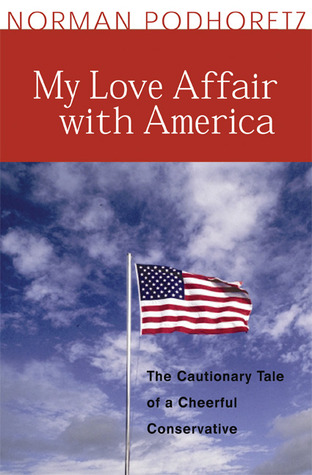This “celebration” of his intense love affair with America will not likely teach Norman Podhoretz’s devotees anything new. For the most part, it incorporates material that can be found in earlier autobiographical writings and in Podhoretz’s other published recollections about life in New York literary circles.
My Love Affair With America includes an extended description of American Jewish life among predominantly Eastern European Jewish immigrants and their offspring in New York during and after World War II. These people made efforts to fit into what they understood as mainstream America, and if they were eager to change that mainstream (which they helped to do over time), they also cultivated their own brand of American patriotism. As defined by Podhoretz, it consisted of a general admiration for what the Founding fathers had done, or were imagined to have done, typically understood through the prism of the New Deal. It also included identification with the Puritans as judaizing Christians and the creators of a non-antisemitic New World. Podhoretz shows how these formative elements came together in the American Jewish culture of the 40’s and early SO’s and found expression in Commentary, a magazine founded in 1945 by an archetypal Cold War liberal and strongly self-identified Jew, Elliot E. Cohen. Although Podhoretz initially pushed the same publication toward the left after assuming its editorship in 1960, he correctly identifies the orientation with which it started. He believably asserts that the Jewish community to which he belonged showed little concern about antisemitism, which it assumed was waning —to the extent it ever existed—in the United States and that the holocaust did not rank high among postwar Jewish preoccupations. Never did one encounter in the conventional Jewish discourse of the time the eventually ubiquitous charge, which found its way into Commentary on Podhoretz’s watch, that the Nazis were driven by Christian conviction into slaughtering Jews. That was simply not the kind of thing that even inveterate goy-bashers were likely to say in 1950.
Having made these points, Podhoretz never explains—to my satisfaction at least—how the Jewish culture of his youth morphed into one he now deplores. He is right that communists and communist fellow travelers constituted only a minority of American Jews, and that after Jewish communists had embraced the party line during the years of the Soviet-Nazi pact, they lost all moral status among most of their fellow Jews. One would also have been hard pressed in those years to find significant Jewish support for gay rights or for most of the rest of the yuppie-left agenda now espoused, according to polls, by the vast majority of American Jews. The changes in mood that Podhoretz is aware of can be explained by looking at causes that his “cautionary tale” does not go into, from the self-destruction of a once self-confident WASP society to the rapidly changed position of deeply ethnocentric and long socially isolated Eastern European Jewish communities in the United States. Unlike their Sephardic and German Jewish predecessors, these groups resisted assimilation, bore continuing resentment against Christians, and became increasingly anxious about antisemitism the higher they climbed on the socioeconomic ladder. This status anxiety is apparent in Podhoretz’s own invectives against alleged antisemites and in his preoccupation in this book and elsewhere with who is, and who is not, on the right side (in both senses) in matters that bear on Israel.
The most embarrassing illustrations of his obsessions are the remarks Podhoretz devotes to those he condemns as “cheerless conservatives.” Among these are the New England man of letters James Russell Lowell, the historian Henry Adams, the Southern .Agrarians, and “their intellectual and political descendants of the latter part of the century, the ‘paleoconservatives.'” Although he tars all of these figures with the same antisemitic brush, it is unclear that any of this distinguished company wasted much time insulting Jews. Lowell represented the kind of Protestant Podhoretz should appreciate, and this Boston Brahmin associated with Jews and praised their “talent and versatility.” Nonetheless, Podhoretz tells us, Lowell also made remarks, as vaguely intimated by Edmund Wilson, suggesting grave concern that Jews threatened his social class. Henry Adams, though the relevant texts are never quoted, complained portentously about the effects of the immigration of uncultivated Catholics and ambitious Jews into Protestant America. In an allegedly similar way, the paleos have committed the sins of opposing Third World immigration and disliking a development Podhoretz has a proprietary interest in preserving, American imperialism. On these subjects, our cheerful conservative is driven to distraction, revealing not only an exceedingly thin skin but also a tasteless mean streak. Thus we learn that, although paleos resemble Southern Agrarians (particularly in their undemonstrated antisemitism), these bigots are a “lesser breed and could boast no adherent of even remotely comparable stature.”
After exerting himself to drive cheerless conservatives out of the public square, Podhoretz cannot be so dense as to fail to see that he and his friends have played a major role in preventing paleos from achieving the stature that earlier generations of traditionalists were able to attain. As in his earlier writings about himself, the subject of Podhoretz’s celebration eventually becomes his own putative achievements, among them a signal success in marginalizing the “lesser breed” on his right while helping to shape the political conversation in collaboration with other certified “patriots.”
[My Love Affair With America: The Cautionary Tale of a Cheerful Conservative, by Norman Podhoretz (New York: Free Press) 248 pp., $25.00]



Leave a Reply